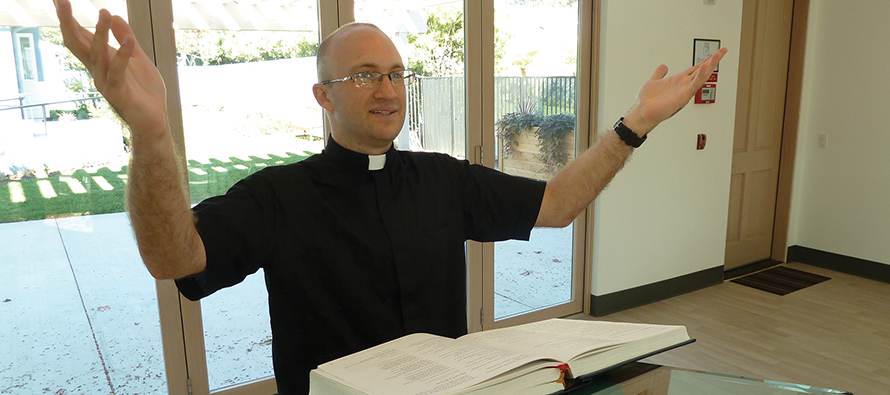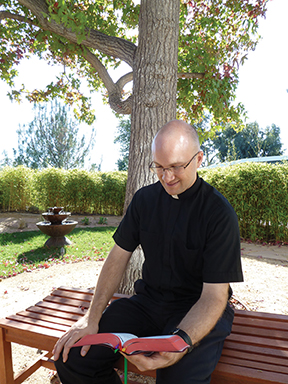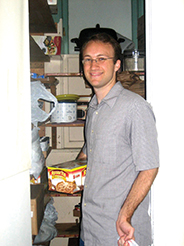Racing toward my religious vocation

Image: Early on, Nicholas Collura was attracted to celebrating the sacraments. Here, he reads from a lectionary, dressed for ministry in a Roman collar, as is the practice among Jesuit novices.
She burst into tears as suddenly as if she’d been hit in the face. I stood there, stunned and staring, uncertain what to say.
My job in the Jesuit Volunteer Corps was to direct a social service office in an urban parish in Texas. On that overcast day a week before Christmas, a big-hearted businessman had visited our little church with a stack of $500 gift cards he wanted to donate—anonymously—to the neediest members of our community. I had the privilege of choosing the recipients and making the deliveries.
When I arrived at the home of the young single mother whose tears I recall to this day, she and her four young children were piling into a dilapidated car where they would spend the next few nights while a local handyman repaired the roof of her crumbling house. The tears that she shed when I gave her the gift card were ones of incredulous joy.
Stepping into this drama of hardship, charity, and gratitude, I knew that I’d encountered something to do with the meaning of life—and I knew that I wanted more.
In those days, I used to run around the track of the local high school, humming silly little tunes to set my pace. One day I found myself jogging to a simple refrain that came unbidden to mind: “I want . . . to be . . . a saint. I want . . . to be . . . a saint.” After a few laps, the refrain suddenly changed, and I picked up speed and went careening around the field: “I want . . . to be . . . a priest! I want . . . to be . . . a priest!”
Why in the world did those words—and that crazy desire—come into my head? Why would anyone want to become a priest?
What moved me to this life
As I look back on the experiences that first moved me to enter the Jesuit novitiate (the first stage of religious formation), I see how my reasons for pursuing consecrated life have grown out of one another. One of the things that initially drew me was the allure of celebrating the sacraments. In my first few months of discernment, many years ago now, I would sing the words of the eucharistic consecration whenever I was alone in my car. But when chasubles and incense took a disproportionately large place in my early fantasies, I realized that a desire to be seen as holy is not the same as the desire to be holy. What makes us holy is not primarily ritual but rather love. It is our thirst for justice, our practice of kindness, our way of relating to people.

Working in a disadvantaged neighborhood, I saw the suffering of the poor firsthand. My eyes opened to tremendous needs. Moreover I saw how deeply our parishioners trusted the Jesuits, who had consecrated their entire lives to the cause of love in the midst of a world that otherwise held little but cruel disappointments for the poor.
Their vows of poverty, chastity, and obedience are not easy ones. While they are not necessary for a life of service, when I saw that so many religious found their vows to be freeing rather than a burden, I began to ask myself questions. Could taking religious vows be a way for me to devote my time—and more important the emotional and spiritual energy I have available for love—to single-hearted service of the people of God?
Marriage vows can liberate people, too. So can other forms of single and community life. No vocation is holier than any other. I hate to hear the priesthood described as a “higher calling.” How can one calling be better when they all come from God? The question is, which form of life will help each of us, with our individual personalities, flourish?
Marriage and children will not hold the answer for everyone. Celibate priesthood and religious life—what Sister Sandra Schneiders, I.H.M. calls “an exclusive commitment to the unmediated God-quest”—offers a different, somewhat intense life of community, solitude, prayer, and service. I have always had a certain spiritual intensity myself, and it was ultimately this match between intensities—mine and that of religious life—that moved me to join the Jesuits.
Respond to two callings
Naturally I have faced struggles in the process of vocation discernment. One had to do with the fact that ever since I was a boy I dreamed of becoming a writer. That desire is deep in me, so when I first began contemplating the priesthood, I was afraid I’d be giving up not just marriage and family and a certain degree of autonomy but a major part of who God had created me to be.
So I was delighted to discover that some people are called to live out their priesthood in a religious community, which recognizes the possibility of a dual vocation. The Christian Brothers, for instance, are called to consecrated brotherhood and to educational ministry. The Franciscans, normally, are called to religious life and to work with the poor. The Jesuits, whom I have joined, are well known for “finding God in all things” and often work outside conventional church settings. They have been described as “hyphenates”: for example, there are Jesuit-scholars, Jesuit-doctors, Jesuit-astronomers, Jesuit-activists, even Jesuit-filmmakers. I could, in fact, be a Jesuit-writer. It was liberating to realize that in the Jesuit community I could honor both the religious and creative parts of myself rather than having to choose between them.

I recall a wonderful story about a Chilean Jesuit who, after being ordained, went to his superior with a strange request: He deeply believed that God was calling him to become a circus clown, to make children smile in a world where so often their young lives were filled to the brim with sadness.
Rather than laughing this Jesuit out of the order, his superior decided that if one of his guys was going to be a clown, he should be the best clown he could be—and he sent him to Cirque de Soleil for circus training! For this Jesuit, blessed with generous and understanding superiors, the priesthood did not exhaust but enriched his vocational call.
Waiting for God to surprise me
There have been other challenges in my religious discernment. The vows are not easy. The church is not perfect. While I’m still attracted to celebrating the sacraments, in today’s church I’m finding there are plenty of other ways to be a good shepherd that do not require ordination. So I wonder at times if perhaps I should become a brother instead.
I have come to realize that questions and concerns are not setbacks but gifts to consider. I’ve learned that God’s grace does not depend on whether we are celebrating the sacraments—or in fact whether we are doing any one particular thing—but on the extent to which we have surrendered our lives to God in love and gratitude. The fact that there are innumerable ways to do so means that God overflows with creativity, and we can, too. This is cause for joy.
My vocational confusion has taught me a great deal about trust. Vocation is a mystery that grasps us; it is not something we can ultimately grasp. Many priests report that they entered the novitiate or seminary for their own reasons and wound up staying for completely different ones—reasons known in advance to God alone.
As I continue my novitiate, I reflect on the many dimensions of my desire for religious life: a love of people, a longing to serve them, an attraction to sacramental ministry, a wish to consecrate my time and love to the drama of the human soul before God. Yet I have no desire to live out my expectations for my future. Rather, I wish to discover how God will surprise me.
In the end, I’ve found that the surest sign of a divine call has nothing to do with total certainty or absolute comprehension. For me it has more to do with whether thinking about a particular form of love—life as a religious order priest—quickens my pace as I run around a racetrack, filling me with excitement and joy.
Tags
Related
- Taking a chance on God: Profile of Father David Gutierrez, C.M.F.
- About-face to the priesthood
- Moved by the power of the Eucharist: Profile of Father Duy Henry Bui Nguyen, S.C.J.
- No regrets: A grateful priest takes stock
- We’re different—in a good way: Profile of Father Roberto Mejia, O.Carm.
- Man with a mission
- Monastic life is habit-forming
- Ministering to migrants in a carport cathedral
- Connections make the man: Profile of Father Kevin Zubel, C.Ss.R.
- A priest (who’s been there) responds to the pain of addiction Read More
Most Viewed
- Find your spirituality type quiz
- Questions and answers about religious vocations
- Celibacy quiz: Could I be a nun? Could I be a brother? Could I be a priest?
- Resources for older discerners or those with physical and developmental differences
- About Vocation Network and VISION Guide


